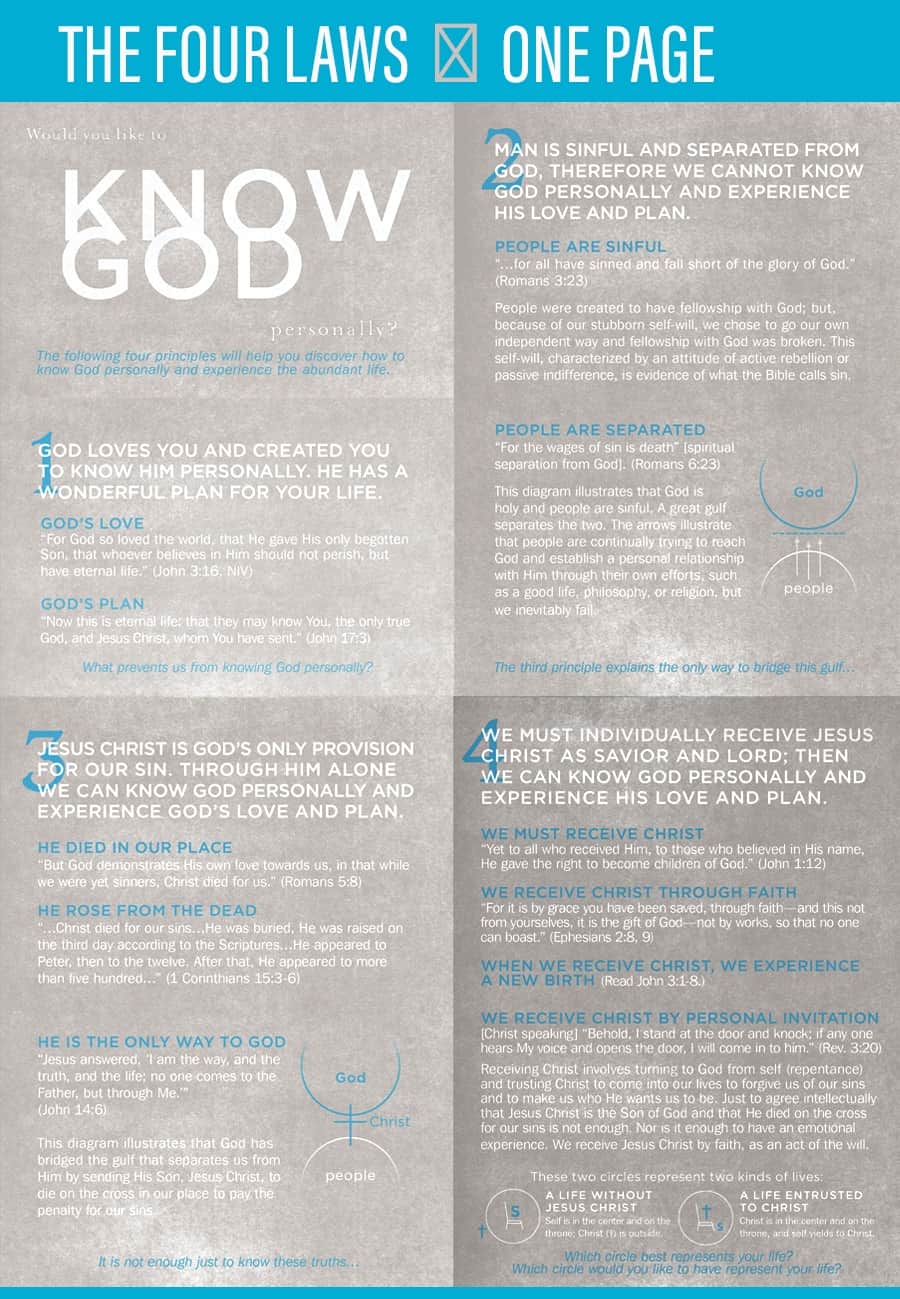How to Bring up God in Everyday Conversations
Initiating conversations about God with non-Christian friends or family can feel very awkward. This article offers practical advice on ways to do that more naturally and easily.
 by Mike Chapman
by Mike Chapman
 Photo by Guy Gerrard
Photo by Guy Gerrard
Do you ever get tongue-tied when trying to bring God into everyday conversations with friends, family, and co-workers? As much as you care for the people you do life with, talking about your faith in God can feel incredibly awkward and intimidating. What if you say the wrong thing and look foolish? What if they reject you? What if they ask questions you don’t know how to answer? Having the right perspective, some preparation, and a few tactics will boost your confidence to discuss your faith in a natural way.
Perspective
First, remember that Jesus says, “And when I am lifted up from the earth, I will draw everyone to myself” (John 12:32, New Living Translation). God the Holy Spirit’s job is to prepare people to hear and respond. We’re invited to point people to Him by sharing what He’s done in our lives. If by your words and actions, you move a person one step closer to Jesus, you’ve been successful. Dr. Bill Bright, co-founder of Cru, said that successful witnessing means sharing Christ in the power of the Holy Spirit and leaving the results to God.
Preparation
Think through your relationships. Is this person an acquaintance, casual friend, close friend, or family member? Your approach may change based on how well you know them. What common ground do you have with them — interests, hobbies, similar families or upbringings? What do you know about them? What would you like to know about them? As you learn more about their needs, desires and hurts, you can share some of your own and how Jesus has made a difference for you. Make sure to avoid Christian jargon — churchy words or phrases your friend might not be familiar with.
 Photo by Guy Gerrard
Photo by Guy Gerrard
Presenting Opportunities
One of your most important tools is your coming-to-faith story, also called your “testimony.” Know it well enough to share it at a moment’s notice when conversations turn to God. Example: “I’ve been thinking about spirituality a lot lately, and I think everyone is on a spiritual journey. What’s your journey been like?”
Those you see everyday may have already seen your faith in God reflected in your character and the way you treat others. Don’t worry about being perfect. People often relate more to our struggles than our wins. Be honest about your own challenges, and how your faith has helped, including answers to prayer.
Use good, open-ended questions (that can’t be answered with a “yes” or “no”) to start conversations. Once they’ve answered, you’re free to provide your answers, which might simply mention God. Examples:
“What do you think of (current event)?” Your answer: “At times like these, I’m thankful Jesus experienced life as a human. He can empathize with us.” They may be curious about your perspective. Be prepared to share how you find comfort in God. See Philippians 4:6,7; John 14:27, 16:33.
“Do you have any plans this weekend?” Your answer: “I’m looking forward to having lunch with friends after church. Would you like to join us?”
“Where did you grow up? What was that like?” Your answer: “I had a pretty normal childhood in ____________. I grew up going to church, was involved in clubs, played sports, etc.” Talking about your upbringings can help you understand more of your friend’s faith journey. Listening well will help your friend feel seen and known.
“What was the best/worst part of last week for you?” Your answer: “It was kind of hard, actually, because of ____________. Yet in the midst of this, I’ve been finding encouragement through my relationship with God. I believe He’s with me in the middle of hardships, and I’ve really felt his peace lately.” Or “It was a great week! You know how I’ve been really struggling in my job lately? Well, I got a promotion, and it truly feels like a gift from God!” If you’re honest and vulnerable about your life, your friend or family member will feel freer to be vulnerable too.
Invite them to fun social events with your Christian friends, like a Super Bowl or Oscars watch party, a potluck dinner, or a holiday gathering, and see how often God comes up in conversations. Not only can you get to know each other better in a relaxed, low-pressure environment, but they’ll also get to see other Christians whose lives reflect the fruit of the Holy Spirit.
When I worked with Cru’s Hollywood Ministry, one of our most effective strategies was getting non-Christians in the same room with Christians for a holiday party. The non-Christians NOTICED. We’d get calls afterward saying, “That was the best party I’ve been to since I came out here. No one cared about my career. They cared about me! Any event you guys put on, I want to come to!” People enjoy being around Christians who are demonstrating the fruit of the Spirit.Invite them to join you in some kind of Christian service project, like food/clothing distributions, toy giveaways, or feeding the hungry at a local church or rescue mission. Then ask for their thoughts about Matthew 25:35-40.
Watch and discuss movies or books with strong spiritual themes as springboards to deeper conversations. Examples: Use the latest “superhero” or “action hero” movie and ask questions about good and evil or where and why the hero falls short. Bring up specific characters from the Bible that had similar strengths or shortcomings. Or discuss the latest book you’ve read or podcast you’ve listened to. Where did you find redemption in the story? Did you relate to someone’s hardship? What did you notice about humanity?
Hobbies — Invite them to participate in some of your favorite activities and offer to join them in theirs. Whether your hobbies involve creating or competing, you can bring up biblical examples (God’s creativity or Paul’s athletic illustrations) while you’re engaging in the activity.
For example, I love to cook, so if I invite friends over for a meal and involve them in the food preparation, it’s easy to bring Scripture into the conversation. “Cooking is one of my favorite creative pursuits. That’s one of the ways we reflect the image of God we were originally created in. How do you express creativity?”
 Photo by Guy Gerrard
Photo by Guy Gerrard
Prayer for, and eventually, with them
The most important thing you can do is pray. Pray for the people in these day-to-day relationships, that God prepares their hearts, and opens doors for you to talk about Him. Also ask God to give you His loving boldness and the confidence to naturally mention Him in everyday conversations. If and when they want to know more, learn how to lead someone to Christ here, or make use of these free apps to lead them to Jesus.































